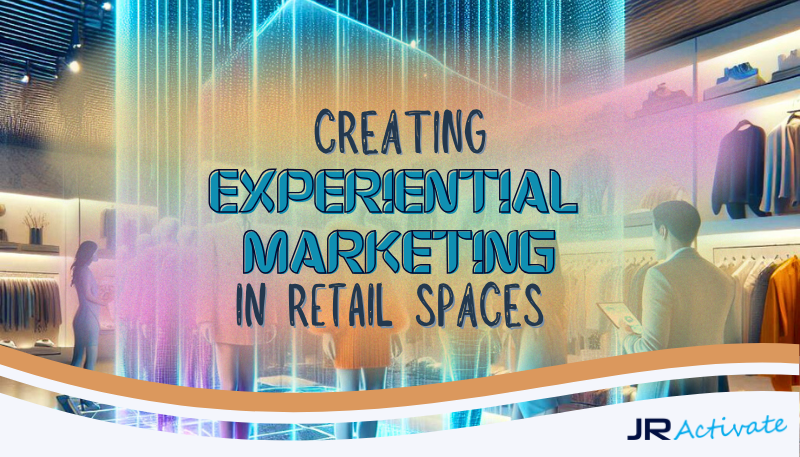Imagine walking into a store and being greeted by an immersive VR experience that transports you to another world. This is the power of experiential marketing in retail spaces. Studies show that experiential marketing can boost brand awareness by up to 70%, creating a memorable experience for customers.
In today’s competitive retail landscape, experiential marketing is crucial for brands to stand out. By creating interactive experiences and pop-up events, marketers can engage their target audience on a deeper level, fostering brand loyalty and emotional connections. This blog will explore the benefits of experiential marketing, successful experiential marketing campaigns, and how to implement effective marketing strategies.
At JR Activate, we specialize in crafting experiential marketing campaigns that align with your brand’s identity, ensuring a unique experience for your potential customers. Let us help you create a lasting impact and drive sales through innovative brand activations.
Understanding Experiential Marketing
Experiential marketing is a dynamic approach where brands create immersive and interactive experiences for their target audience. Unlike traditional marketing, it focuses on engagement and emotional connection. Key elements of a successful experiential marketing campaign include brand activation, in-person interactions, and memorable experiences. These marketing strategies aim to boost brand awareness and create a sense of brand loyalty.
By offering hands-on activities and immersive experiences, marketers can leave a lasting impression on potential customers. Experiential marketing is particularly effective in pop-up events and live marketing, ensuring the brand’s message resonates deeply.
The Benefits of Experiential Marketing for Retailers
Increased Foot Traffic:
Experiential marketing can significantly attract more customers to your store. By creating immersive and interactive experiences, retailers can draw in a target audience eager to engage with the brand. Pop-up shops and live events are excellent examples of experiential marketing that can boost brand awareness and bring in potential customers.
Longer Dwell Time:
Engaging experiential marketing campaigns encourages customers to stay longer in your store. When customers are involved in a memorable experience, such as a VR demonstration or a hands-on product trial, they are more likely to spend additional time exploring your product or service. This immersive experience can create a sense of connection and brand loyalty.
Improved Customer Satisfaction:
Data and case studies show that experiential marketing positively impacts customer satisfaction. When customers have a unique experience that aligns with your brand’s identity, they leave with a lasting impression. This emotional connection fosters customer loyalty and encourages word-of-mouth marketing.
Boosted Sales:
Experiential marketing can lead to increased sales and conversions. By offering memorable moments and interactive experiences, retailers can create a brand activation that resonates with customers. Successful experiential marketing campaigns like those by Red Bull demonstrate how experiential marketing can drive sales and enhance brand awareness.
Incorporating experiential marketing strategies into your marketing efforts provides a unique opportunity to engage with your target audience on a deeper level. This approach not only boosts brand awareness and loyalty but also ensures that the experience aligns with your brand’s identity, leaving a lasting impact on your customers.
Creating Engaging Retail Experiences
Interactive displays:
Utilizing interactive technology in retail spaces can captivate customers and create a unique brand experience. Interactive displays allow potential customers to engage with the product or service in a hands-on manner, making the experience more immersive and memorable. This approach can significantly boost brand awareness and foster a deeper emotional connection with the target audience.
Personalized experiences:
Tailoring experiences to individual customers is a powerful marketing strategy. By understanding customer preferences, marketers can create personalized experiences that resonate on a personal level. This not only enhances the brand’s appeal but also builds customer loyalty. Experiential marketing campaigns that focus on personalization can leave a lasting impact and drive word-of-mouth marketing.
Sensory marketing:
Engaging the senses is a key element in creating memorable experiences. Sensory marketing involves stimulating the senses through sight, sound, touch, taste, and smell. This approach can create a unique experience that customers associate with the brand, enhancing brand awareness and loyalty. For example, a pop-up shop with a distinct scent or a live event with interactive elements can leave a lasting impression.
In-store events:
Hosting events and activations in retail spaces offers numerous benefits. In-store events provide an opportunity for brand activation and allow brands to interact with the public in a meaningful way. These events can range from pop-up shops to live marketing events, creating memorable moments that boost brand awareness. Experiential marketing events also encourage social sharing, further amplifying the brand’s reach.
By integrating these experiential marketing strategies, retailers can create engaging and immersive experiences that resonate with their target audience and drive brand loyalty.
Tips for Implementing Experiential Marketing in Your Retail Store
Budget considerations:
Allocating resources for experiential marketing is crucial. Start by identifying your marketing goals and determining how much you can invest in creating a memorable experience. Consider the costs of pop-up shops, interactive experiences, and immersive technologies like VR and augmented reality. Collaborate with your marketing team to ensure the budget aligns with your brand’s identity and objectives.
Measurement and analysis:
Tracking the effectiveness of your experiential marketing campaign is essential. Use marketing tools to measure brand awareness, customer engagement, and brand loyalty. Analyze data from social sharing, word-of-mouth marketing, and in-person interactions to gauge the success of your experiential marketing strategies. Regularly review these metrics to refine your approach and achieve your marketing goals.
Adapting to changing trends:
Staying updated on consumer preferences and industry trends is vital for successful experiential marketing. Monitor the latest experiential marketing examples and real-life examples of successful experiential marketing campaigns. Adapt your marketing strategies to incorporate new technologies and digital experiences. Engage with your target audience through live marketing events and pop-up stores to create a unique experience that resonates with them.
By focusing on these tips, you can create an experiential marketing strategy that not only boosts brand awareness but also fosters a genuine connection with your potential customers. This approach will help you drive sales, enhance customer loyalty, and leave a lasting impact on your audience.
Ways to Create Engaging Experiences in Small Retail Spaces
Frequently Asked Questions (FAQs)
What is experiential marketing and how does it benefit retail spaces?
Experiential marketing involves creating immersive and interactive experiences that engage the target audience. It benefits retail spaces by boosting brand awareness, creating a memorable experience, and fostering an emotional connection with potential customers. This type of marketing can increase brand loyalty and drive sales by offering a unique experience that traditional marketing strategies may not achieve.
How can a brand implement an experiential marketing campaign in a retail space?
A brand can implement an experiential marketing campaign by organizing pop-up shops, interactive experiences, and live events. These activations should align with the brand’s identity and create a sense of immersion for the customers. Utilizing VR and augmented reality can enhance the brand experience, making it more memorable and engaging.
What are some examples of successful experiential marketing campaigns in retail?
Successful experiential marketing campaigns include Red Bull’s extreme sports events and pop-up stores that offer hands-on product demonstrations. These campaigns often create a lasting impression and encourage social sharing, which boosts brand awareness and engagement. Real-life examples of experiential marketing show how brands can effectively use this strategy to connect with their audience on a deeper level.
What are the key components of an effective experiential marketing strategy?
Key components include understanding the target audience, creating an immersive experience, and ensuring the activation aligns with the brand’s identity. Marketers should focus on interactive elements, such as VR and augmented reality, to create a unique opportunity for customers to engage with the product or service. Additionally, leveraging influencers and social media hashtags can amplify the reach of the marketing event.
How can experiential marketing increase brand awareness and loyalty?
Experiential marketing increases brand awareness by creating memorable moments that customers are likely to share via word-of-mouth and social media. This type of engagement marketing fosters a genuine connection with the audience, leading to increased brand loyalty. By offering a unique and immersive experience, brands can leave a lasting impact on their customers.
What are the benefits of using experiential marketing in retail spaces?
The benefits of experiential marketing in retail spaces include increased customer engagement, higher brand awareness, and improved customer loyalty. This marketing approach allows brands to interact with the public in person, creating a more personal and impactful connection. It also provides a platform for brands to showcase their products or services in a way that traditional advertising cannot, leading to a more effective marketing campaign.
The End
Experiential marketing offers retail businesses a unique opportunity to boost brand awareness and create a memorable experience for their target audience. By using immersive and interactive experiences, brands can build an emotional connection with potential customers, driving customer loyalty and increasing sales. Successful experiential marketing campaigns, such as pop-up shops and VR activations, demonstrate the benefits of experiential marketing in creating a lasting impact.
Implement these marketing strategies to elevate your brand experience and engage your audience on a deeper level. Contact us at JR Activate to learn more about how experiential marketing can transform your retail space. Let’s create a sense of excitement and drive sales together!






